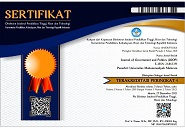Collective Action and Climate Change Adaptation in Makassar
Abstract
Keywords
Full Text:
PDFReferences
Burch, S. (2010). Transforming barriers into enablers of action on climate change: Insights from three municipal case studies in British Columbia, Canada. Global Environmental Change, 20(2), 287–297.
Cardenas, J.-C. (2003). Real wealth and experimental cooperation: experiments in the field lab. Journal of Development Economics, 70(2), 263–289.
Cardenas, J. C., Rodriguez, L. A., & Johnson, N. (2011). Collective action for watershed management: field experiments in Colombia and Kenya. Environment and Development Economics, 16(3), 275–303.
Carpenter, J. P., Daniere, A. G., & Takahashi, L. M. (2004). Cooperation, trust, and social capital in Southeast Asian urban slums. Journal of Economic Behavior & Organization, 55(4), 533–551.
Cole, D. H. (2008). Climate change and collective action. Current Legal Problems, 61(1), 229–264.
Elliott, C., & Schlaepfer, R. (2001). Understanding forest certification using the Advocacy Coalition Framework. Forest Policy and Economics, 2(3–4), 257–266.
Fresque‐Baxter, J. A., & Armitage, D. (2012). Place identity and climate change adaptation: a synthesis and framework for understanding. Wiley Interdisciplinary Reviews: Climate Change, 3(3), 251–266.
Glicksman, R. L. (2010). Climate change adaptation: A collective action perspective on federalism considerations. Envtl. L., 40, 1159.
Groulx, M., Lewis, J., Lemieux, C., & Dawson, J. (2014). Place-based climate change adaptation: A critical case study of climate change messaging and collective action in Churchill, Manitoba. Landscape and Urban Planning, 132, 136–147.
Harris, P. G. (2007). Collective action on climate change: The logic of regime failure. Nat. Resources J., 47, 195.
Holdren, J. P. (2010). Climate-Change Science and Policy (Vol. 1). Island Press.
IGRK Report and Makassar City Mitigation Action 2010-2030.
IPCC. (2007). Climate change 2007: impacts, adaptation and vulnerability. 2300.
IPCC. (2014). Climate Change 2014 impacts, adaptation, and vulnerability: IPCC Working Group II contribution to AR5. Geneva, Switzerland: IPCC.
Lawler, J. J. (2009). Climate change adaptation strategies for resource management and conservation planning. Annals of the New York Academy of Sciences, 1162(1), 79–98.
Leduc, T. (2007). Fuelling America’s climatic apocalypse. Worldviews: Global Religions, Culture, and Ecology, 11(3), 255–283.
Makassar Regional Action Plan (RAD). (2020). Mitigasi dan Adaptasi RAD (Rencana Aksi Daerah) Perubahan Iklim Kota Makassar (Vol. 15).
Malik, I., Rusnaedy, Z., & Khaerah, N. (2021). Coastal Women’s Resilience Strategy against Climate Change Vulnerability in Makassar, Indonesia. E3S Web of Conferences, 277.
Olson Jr, M. (1971). The Logic of Collective Action: Public Goods and the Theory of Groups, with a new preface and appendix (Vol. 124). harvard university press.
Ostrom, E. (2010). Analyzing collective action. Agricultural Economics, 41, 155–166.
Rusnaedy, Z., & Haris, A. (2021). Advocacy Coalition in The Arrangement of The Coastal Slum Area of Untia in Makassar. Journal of Governance and Public Policy, 8(1), 71–81.
Smit, B., & Wandel, J. (2006). Adaptation, adaptive capacity and vulnerability. Global Environmental Change, 16(3), 282–292.
DOI: https://doi.org/10.31764/jgop.v5i1.13376
Copyright (c) 2023 Anirwan Anirwan
This publication is indexed by:





.png)










1.JPG)